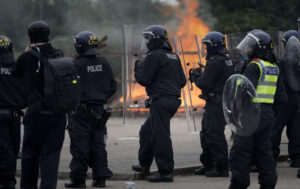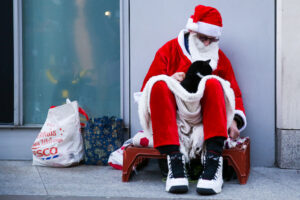The festive period owes Charles Dickens a monumental intellectual debt. A Christmas Carol largely invented the festivity as we continue to celebrate it today. But his tale also reminds us of the power of magic and restitution in the blizzards of unforgiving times: it gives agency and voice to the marginalised, the disposable, and the forgotten of history. It’s a tale that resounds through time to reveal what happens when we grapple with the truth of being human.
A Christmas Carol is a tale of two tragedies. There is the tragedy that is destined to happen: the death of Tiny Tim, victim of the structural violence of destitution. But the second tragedy belongs to the past. The tragedy that turned a kind and humble person into a monster. This is the tragedy that defines Ebenezer Scrooge.
Scrooge is a darkness surrounded by an even more impenetrable darkness. “Darkness is cheap, and Scrooge liked it,” Dickens says of his protagonist’s uncharitable and barren homestead. Scrooge is indistinguishable from his shadow. Dante’s hell was not ablaze but resided in the frozen depths of torment and despair. Scrooge belongs to those depths. He befriends the misery, revels in the isolation, walks through its gates with a pessimistic howl. His soul is as cold as the steel nail, which Dickens invokes from the outset to describe his dead partner, Jacob Marley. Scrooge, in short, is dead while alive, “secured from surprise”, emotionally adrift from the fires of the world.
His behaviour would stand out as markedly different from the ostentatious and lavish displays of wealth that were so often paraded by the merchant colonists of Victorian Britain. Theirs was, after-all, a time of extraordinary splendour. And at the time, while Dickens was writing the complementary social tales of Oliver Twist and Bleak House, the wealth extracting machine of the British Empire was in primal overdrive (especially in the mining colonies at home). But what matters is not whether Scrooge is exuberant or thrifty. His penance must be explained through his quest for accumulation. And so Dickens invokes a ghost that goes beyond the tale of one miserable man: the ghost who clanks the chains of social forces. Who really carries those chains?
This is a radical move from Dickens, as he seeks to turn this world on its head. He transforms the powerful into the powerless, so that they become forced witnesses without the capacity to bring about change. What also made Dickens revolutionary for his time was his conjuring of the idea that humans were not born evil or sinister. If A Christmas Carol has us reflecting upon the notion that residing even in the darkest of hearts, there is still the glimmer of a flame that is the spark of our humanity, it is also a tale of how we might all be the products of circumstance.
But this also demands more from us. Most would shed a tear for the mercilessly fated child who lays dead in the snow. It’s far more difficult to help others break a frozen sea within. Charity works in mysterious ways, Dickens advises. It concerns both the materially and spiritually impoverished.
It shouldn’t be lost on us today that Christmas has become thoroughly commodified and its meaning so often stripped of its spiritual aspiration. If the ghost of Christmas past might remind us of all the wasteful products we have bought, the ghost of the present would still have us buying more, while the yet to pass would have us still unfulfilled, because the desire to find meaning in stuff is never fully satisfied.
Dickens was a materialist. He knows that bread matters. But he invests material objects with subjective resonance. Doorknockers become harrowing faces, staircases become passages into the desolation of the empty withering heart, and the flickering candle a threshold point between the frosted breath of an aging man and the ephemeral smoke of a ghostly passenger. He who lived for too long and felt too little is one breath away from a soon to be extinguished life. There are here, then, questions of the mystical. That blue melancholic flame symbolises a precarious existence burning in a twilight hour that is torn between wanting its stay and yet willing its vanishing. Death is ever present in this novella, always at the moment of its arrival, yet always deferred.
And yet, our crises laden times are very different from when Dickens was crafting his tale. During the industrial age there was a viable sense of community, where people found support on a daily basis. There were public theatres for people to frequent and express their togetherness. There were libraries in which children collectively learned and bettered their plight. There were organisations that took seriously the local needs of impoverished peoples in personal ways, not just to medicate, but to assure through genuine appeals to solidarity and friendship. And there were neighbours who helped each other through the hard times.
Such bonds have largely given way to a vapid individualism, which has ended up having the poor fight among themselves, all the while the coldness of the digital screen seduces us. Moreover, while Dickens recalls how the “surplus population” was exploited in workhouses (much to the scorn of Scrooge who would without care have them work or have them dead), today we are creating “Armies of the Permanently Unemployed” who are being abandoned by an entirely different yet no less cold-hearted world.
Dickens was no doubt writing from a distinctly religious perspective, but he still managed to touch something human in us all. Humanism and spirituality were not opposed. Yet in today’s apparently secular age, hyper-moralism is so emboldened, the past, present, and future so seemingly assured, that room for the unknown is all but denied. Scrooge would never survive the trials of Twitter and the moral policing that screenshots every indiscretion. We have lost the mysticism, we have lost the capacity to fail, we have lost the ability to be as fallible as a Scrooge, and most important, we have lost the spirit of forgiveness that could be afforded to people who are utterly disagreeable.
But while we can’t be too literal translating the 19th century into the present, we can appreciate the deeper concerns Dickens raises about the human condition. As Ebenezer is brought face to face with his own disregarded tomb and the realisation that in the final act of reckoning, none of it mattered, he is forced to look back upon his life as if he were already dead. It is the deepest of all philosophical questions: how do you live through the tragedy of life while understanding the ephemerality of existence. Dickens, through Scrooge, forces us to consider what life might look like from the perspective of our own death. How might each of our lives change, were we to be open to the company of that apparition? Only the ghosts of time will tell.
Disclaimer
Some of the posts we share are controversial and we do not necessarily agree with them in the whole extend. Sometimes we agree with the content or part of it but we do not agree with the narration or language. Nevertheless we find them somehow interesting, valuable and/or informative or we share them, because we strongly believe in freedom of speech, free press and journalism. We strongly encourage you to have a critical approach to all the content, do your own research and analysis to build your own opinion.
We would be glad to have your feedback.
Source: UnHerd Read the original article here: https://unherd.com/




